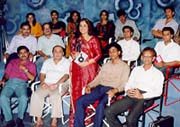Miscellanea / Manjula Padmanabhan
Mass communication is, in every sense,
the genie
of our era's magic lamp
A newly constituted association of film and video professionals
called the Forum for Independent Film and Video has
two compelling arguments in favour of creating a Public Broadcasting
Service. But before telling you about it, a brief commercial
break: Consumer products line the shelves of a supermarket, bright
with brand names. One by one the brand names disappear. What remains
is a collection of grey shapes. A voice the colour of cholesterol
informs us that this featureless void is what the world would
be reduced to if not for the miracle of advertising.
 One argument, to quote from FIF&V's recently published paper,
A Vision for Television is that '....as tax payers (paying both
indirect and direct taxes), the public has helped build the entire
broadcasting infrastructure. Therefore, as consumers and tax payers,
we pay for television.'
One argument, to quote from FIF&V's recently published paper,
A Vision for Television is that '....as tax payers (paying both
indirect and direct taxes), the public has helped build the entire
broadcasting infrastructure. Therefore, as consumers and tax payers,
we pay for television.'
The second argument is - but wait!
It's time for another commercial break: In the final hours before
a sister leaves home for her studies, she broods at the window
while her younger brother frets. What can he do to prove the sacred
fraternal love that has coated the camera's lenses with vaseline?
He has only a thirty-second spot in which to make his decision,
so inspiration has to be instant, just like the coffee he serves.
Smiles as broad as advertising revenues wash the small screen,
as the signature tune swells over a steaming cup of something
dark.
In February last year, the Supreme Court in a judgment delivered
by Justice B P Jeevan Reddy directed that '...broadcasting media
should be under the control of the public as distinct from government..'
The initiative is clearly in the hands of concerned citizens,
yet how many of us are in a position to act upon it? While you
consider this question, a wee commercial break: A woman who looks
as if she's been reconstituted from diesel engine spare parts welcomes
her philandering husband home from a business trip. He presents
her with what would have been an imported television set had he
gone abroad instead of to a tryst in Goa with a mistress who looks
disturbingly like a younger edition of his wife.
I can no longer
recall whether the product being sold was imported television
sets, ideal resorts for adultery or marital discord.
FIF&V's proposal is that India should have a public broadcasting
service, along the lines that have been successful in the US,
UK and Germany. They envisage a channel which is autonomous of
both government and commercial interests, is accessible to a broad
range of producers and provides a platform appropriate to the multi-cultural
and multi-lingual entity that is India.
While we ask ourselves
whether such an ideal is possible in a society as repressed as
ours is reported to be, a quickie commercial: A young man wearing
a shiny sweat-suit harangues the viewer while demonstrating a
torture-rack masquerading as an exercise machine. His voice is
so annoying that the only sane response to his message is to turn
on the mute while praying that his product is a miserable failure
and that he won't be able to afford any more air-time.
 FIF&V suggests that the existing Prasar Bharati Corporation
should consider the possibility of three streams of broadcasting,
one to serve commercial interests, one for official broadcasting
and one for PBS. For those who fear that such a luxury is beyond
the reach of resource-deficient Third World nations, they suggest
that the PBS channel be funded from a percentage of the revenues
from commercial activities connected to television broadcasting, hardware
and licensing.
FIF&V suggests that the existing Prasar Bharati Corporation
should consider the possibility of three streams of broadcasting,
one to serve commercial interests, one for official broadcasting
and one for PBS. For those who fear that such a luxury is beyond
the reach of resource-deficient Third World nations, they suggest
that the PBS channel be funded from a percentage of the revenues
from commercial activities connected to television broadcasting, hardware
and licensing.
The experience of public broadcasting in other
countries has shown that such a proposal is reasonable and highly
productive. But before we consider the benefits of PBS a word
from the would-be sponsor: A masked, red-caped character tangles
with assorted villains to save a damsel who looks like she rather
enjoys distress of the leather-and-boots variety. The adventure
lasts twice as long as commercials normally do, leaving the confused
viewer wondering whether this is a NEW! IMPROVED! episode of the
Mahabarata after all.
Once more, at the end it is not clear what
the product is, batteries or motorcycles? Transvestism or sadomasochism?
Perhaps we are being asked to contemplate the central mystery
of life, such as our reasons for watching third-rate programmes
funded by cynical and manipulative marketers.
Ideally, a PBS is not antagonistic to existing broadcasting interests.
In other countries, the vitality of independent producers and film-makers
has seeped across the air-waves to influence the quality of mainstream
programming. Mass communication is, in every sense, the genie
of our era's magic lamp. It is FIF&V's hope that they can
inspire a movement that will teach ordinary citizens how to harness
that genie instead of being harnessed by it.
|





 One argument, to quote from FIF&V's recently published paper,
A Vision for Television is that '....as tax payers (paying both
indirect and direct taxes), the public has helped build the entire
broadcasting infrastructure. Therefore, as consumers and tax payers,
we pay for television.'
One argument, to quote from FIF&V's recently published paper,
A Vision for Television is that '....as tax payers (paying both
indirect and direct taxes), the public has helped build the entire
broadcasting infrastructure. Therefore, as consumers and tax payers,
we pay for television.'
 FIF&V suggests that the existing Prasar Bharati Corporation
should consider the possibility of three streams of broadcasting,
one to serve commercial interests, one for official broadcasting
and one for PBS. For those who fear that such a luxury is beyond
the reach of resource-deficient Third World nations, they suggest
that the PBS channel be funded from a percentage of the revenues
from commercial activities connected to television broadcasting, hardware
and licensing.
FIF&V suggests that the existing Prasar Bharati Corporation
should consider the possibility of three streams of broadcasting,
one to serve commercial interests, one for official broadcasting
and one for PBS. For those who fear that such a luxury is beyond
the reach of resource-deficient Third World nations, they suggest
that the PBS channel be funded from a percentage of the revenues
from commercial activities connected to television broadcasting, hardware
and licensing.